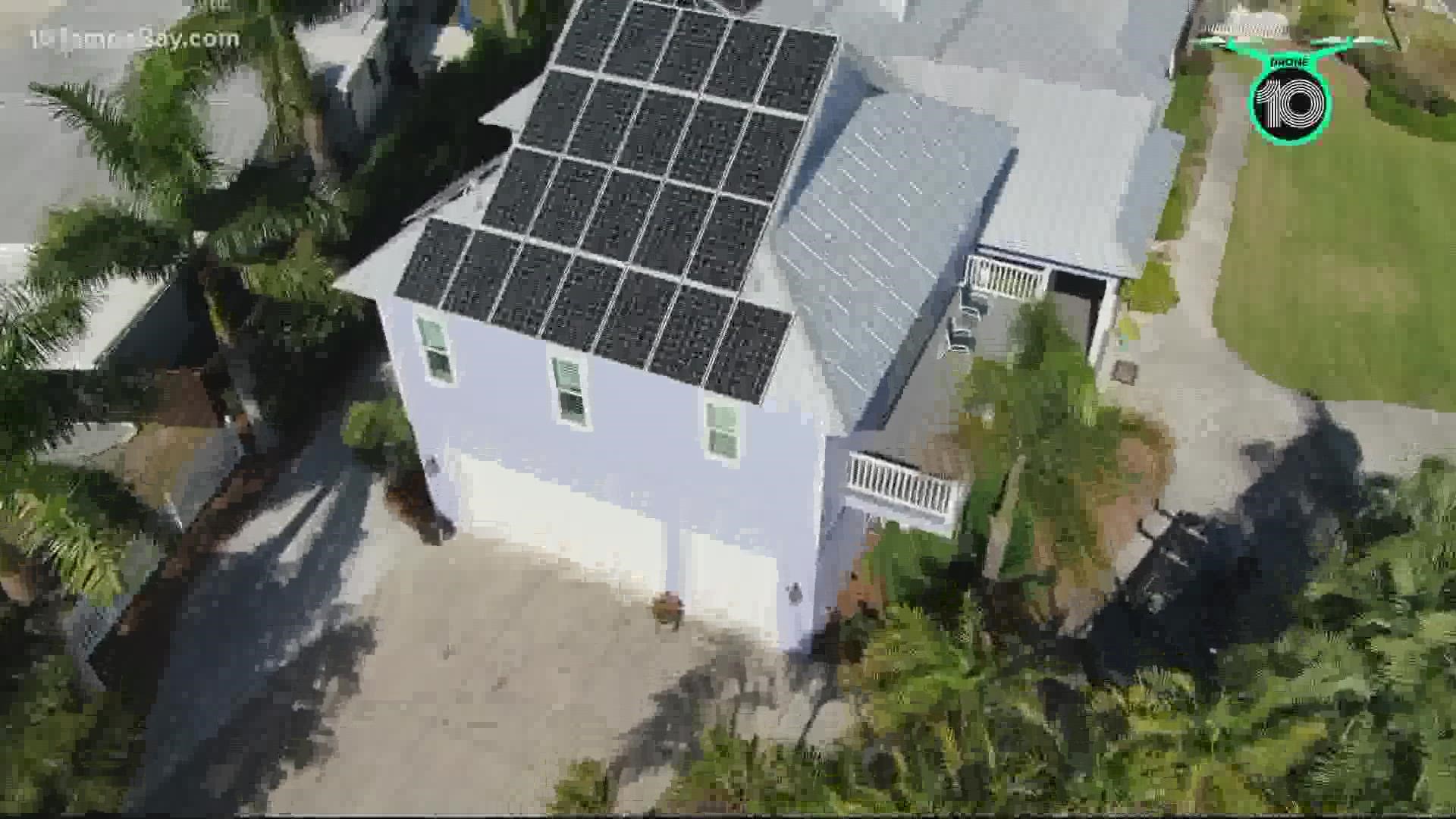SARASOTA COUNTY, Fla. — Many homes have started to go green when it comes to producing their own carbon-neutral electricity. One way some families have done that is through solar energy.
Over the years, many residential and commercial building owners have been taking advantage of that incentive program. However, this week, Florida's Senate Regulated Industries Committee voted 6-2 in favor of approving changes to those incentives.
State Senate Bill 1024, sponsored by Sen. Jennifer Bradley (R-Fleming Island), would lower utility savings on rooftop solar panels by reducing how much utility companies pay consumers who produce more electricity than they use. The bill has generated controversy despite the bipartisan support in the committee.
Supporters have argued the bill has become necessary because of a growing solar industry that's now costing those without solar panels.
However, critics of SB1024 have cried foul and argue that Florida Power and Light, which is one of the nation's largest utility company, not only wrote the bill but aims to squash competition.
"Senate Bill 1024 would effectively turn off the sun for most of the people in the state of Florida," said Bill Johnson, president of Brilliant Harvest. Brilliant Harvest is a solar energy company based in Sarasota.
According to rooftop solar energy system providers like Johnson, the future is bleak for their industry if the bill is passed in its current form. He said utility companies want to eliminate homeowner's ability to provide their own clean electricity.
"What's the utility companies want is for them to be the only people that provide electricity in the State of Florida for which they've had a monopoly on for the last 75 years and it's been exclusive," said Johnson.
Johnson is also a member of the Board of the Florida Solar Energy Industries Association.
At the center of the controversy the bill has stirred is the issue of net metering. Under the current law, set in 2008, home or commercial rooftop solar systems can receive up to 11 cents per kilowatt in form of credits for future use for every kilowatt-hour returned to the grid.
If SB1024 is passed, that incentive would drop to around 2.5 cents per kilowatt-hours which represents a 75 percent cut to the value.
"It will decimate the industry in terms of the financial incentive for solar. Killing that metering will effectively kill the solar industry in Florida," Johnson said.
But a spokesperson for FP&L said the law and incentives are outdated and need to be revamped to reflect current advancements. He said FP&L has provided recommendations to lawmakers on the bill and the company's backing of the legislation is about equity.
The company has argued that 99.5 percent of its customers don't use solar panels but are taking on the cost monthly at $30 million per year currently and an estimated $80 million by 2025.
"Today, customers who sell excess electricity to utilities like FP&L are compensated a full retail rate, but they don't provide a retail service so that upcharge is ultimately paid for by all of our customers. Our issue is with the fact that all of our customers are ultimately subsidizing that private purchase and our stand is very simple: if you choose not to put solar on your roof, you shouldn't be forced to pay for someone else's private purchases," said Chris McGrath, spokesperson for Florida Power and Light.
FP&L has also argued that instead of utilities being forced to pay retail rate for excess electricity, solar energy generators should be credited at what's commonly referred to as 'wholesale rate'.
"They don't provide any of the other services whether it's power plant capacity, poles and wires, a customer service team, billing or restoration crews. They are providing a wholesale product and that's what this legislation would change, how they are compensated, retail to wholesale," said McGrath.
But critics say they are not sold by that reasoning and maintain that there's room for everyone, big and small to thrive in the industry and that a parallel generation of solar energy should be widely encouraged.
"We need utility skilled solar and we need rooftop solar. You don't see the solar industry in Florida going out and saying that the utilities shouldn't be able to do solar it's quite the opposite and we encourage them all the time to do more solar. But strangely the largest industry utility group in the State of Florida is trying to say that this less than 1 percent of the total mix of energy on the grid should be effectively made impossible," Johnson said.
However, FP&L maintained that it is in support of all types of solar energy.
"We want to make sure that we are advocating for equity for all customers and that they also are looking at this issue from the standpoint of what benefits all customers get in the state of Florida. If you look at what is the most cost-effective solar energy, it is indisputably the large scale ground mount solar that we are doing all across the state of Florida. We have 44 solar power plants in operation today and we are just getting started. We are well ahead of schedule in our plan to install 30 million solar panels by 2030," McGrath said.
"Simply put we believe the state benefits the most. and our customers benefit the most when the largest amount of solar is installed at the cheapest possible cost and that's the solar that we're doing. We are looking even further and it's not just solar, it's not just batteries, as we strive to fight climate change, we are even exploring green hydrogen technology which is potentially a technology that could one day unlock 100 percent carbon-free electricity that's available 24 hours a day," he added.
The proposal allows those already using rooftop solar systems to keep doing so under the current net-metering rule for 10 more years.

